Related Research Articles

Andrew Lang was a Scottish poet, novelist, literary critic, and contributor to the field of anthropology. He is best known as a collector of folk and fairy tales. The Andrew Lang lectures at the University of St Andrews are named after him.
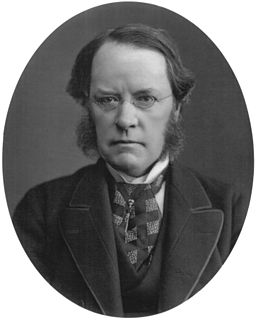
Lyon Playfair, 1st Baron Playfair was a British scientist and Liberal politician who was Postmaster-General from 1873 to 1874.

Sir Arthur Thomas Quiller-Couch was a Cornish writer who published using the pseudonym Q. Although a prolific novelist, he is remembered mainly for the monumental publication The Oxford Book Of English Verse 1250–1900 and for his literary criticism. He influenced many who never met him, including American writer Helene Hanff, author of 84, Charing Cross Road and its sequel, Q's Legacy. His Oxford Book of English Verse was a favourite of John Mortimer's fictional character Horace Rumpole.

Sir Anthony Hope Hawkins, better known as Anthony Hope, was a British novelist and playwright. He was a prolific writer, especially of adventure novels but he is remembered predominantly for only two books: The Prisoner of Zenda (1894) and its sequel Rupert of Hentzau (1898). These works, "minor classics" of English literature, are set in the contemporaneous fictional country of Ruritania and spawned the genre known as Ruritanian romance, books set in fictional European locales similar to the novels. Zenda has inspired many adaptations, most notably the 1937 Hollywood movie of the same name and the 1952 version.

William Dean Howells was an American realist novelist, literary critic, and playwright, nicknamed "The Dean of American Letters". He was particularly known for his tenure as editor of The Atlantic Monthly, as well as for his own prolific writings, including the Christmas story "Christmas Every Day" and the novels The Rise of Silas Lapham and A Traveler from Altruria.

Frederic Harrison was a British jurist and historian.

Frederic William Maitland was an English historian and lawyer who is regarded as the modern father of English legal history.

George Robert Gissing was an English novelist, who published 23 novels between 1880 and 1903. His best-known novels, which have reappeared in modern editions, include The Nether World (1889), New Grub Street (1891) and The Odd Women (1893).

Ferdinand Brunetière was a French writer and critic.

Sir Walter Besant was an English novelist and historian. William Henry Besant was his brother, and another brother, Frank, was the husband of Annie Besant.

John Davidson was a Scottish poet, playwright and novelist, best known for his ballads. He also did translations from French and German. In 1909, financial difficulties, as well as physical and mental health problems, led to his suicide.

Sir Thomas Wemyss Reid was an English newspaper editor, novelist and biographer.
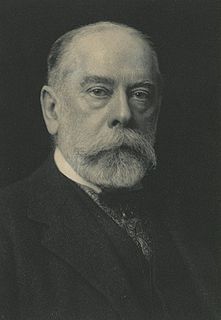
Edwin Lawrence Godkin was an Irish-born American journalist and newspaper editor. He founded The Nation and was the editor-in-chief of the New York Evening Post from 1883 to 1899.
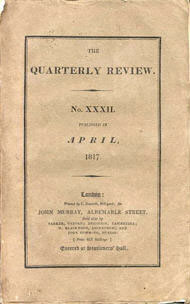
The Quarterly Review was a literary and political periodical founded in March 1809 by the well known London publishing house John Murray. It ceased publication in 1967. It was referred to as The London Quarterly Review, as reprinted by Leonard Scott, for an American edition.
John Lawrence Le Breton Hammond was a British journalist and writer on social history and politics. A number of his best-known works were jointly written with his wife, Barbara Hammond. She was the sister of poet and novelist G. F. Bradby.
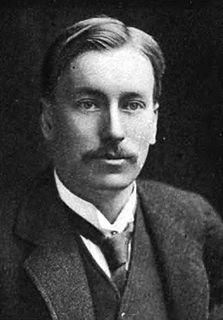
Francis Wrigley Hirst was a British journalist, writer and editor of The Economist magazine. He was a Liberal in party terms and a classical liberal in ideology.
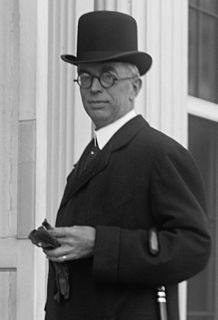
George Brinton McClellan Harvey was an American diplomat, journalist, author, street railway magnate, and editor of several magazines. He used his great wealth in politics. He was an early promoter of Woodrow Wilson, but they became bitter enemies. Harvey was a conservative who wanted Washington to protect big business and harass labor unions. He repudiated Wilson when he saw Wilson oppose political machines and threaten big business in the style of progressive era reformers.
The Saturday Review of Politics, Literature, Science, and Art was a London weekly newspaper established by A. J. B. Beresford Hope in 1855.

Cassell's Magazine is a British magazine that was published monthly from 1897 to 1912. It was the successor to Cassell's Illustrated Family Paper, (1853–1867) becoming Cassell's Family Magazine in 1874, Cassell's Magazine in 1897, and, after 1912, Cassell's Magazine of Fiction.
The Gissing family of Great Britain included several noted writers, Olympic competitors, and teachers.
References
- ↑ The speaker (microform) : a review of politics, letters, science and the arts.Published/Created London : Cassell & Co., 1890-1907, Library of Congress, lccn.loc.gov/sf96091345
- ↑ Brittain, F. (1947). Arthur Quiller-Couch: A Biographical Study of Q. p. 20.
- ↑ Laurel Brake; Marysa Demoor (2009). Dictionary of Nineteenth-Century Journalism: In Great Britain and Ireland. Academia Press. p. 983. ISBN 978-90-382-1340-8.
- ↑ Coustillas, Pierre, ed. London and the Life of Literature in Late Victorian England: the Diary of George Gissing, Novelist. Brighton: Harvester Press, 1978, p.213.
- ↑ "Reid, Sir (Thomas) Wemyss". Who's Who: 1343. 1905.
- ↑ "The Speaker (changes in ownership)". The Speaker: The Liberal Review: 469. 25 August 1906.
- ↑ Havighurst, Alfred F. (1974). Radical Journalist: H. W. Massingham (1860–1924) . Cambridge University Press. p. 143.